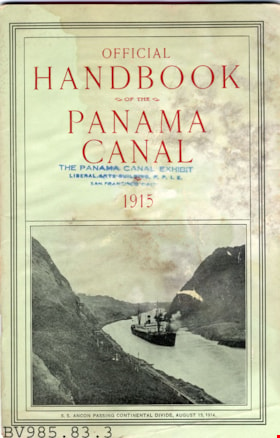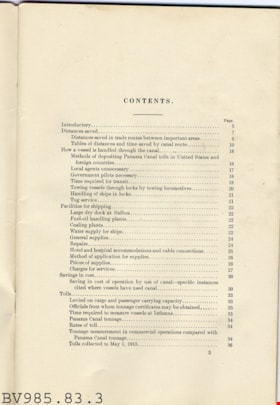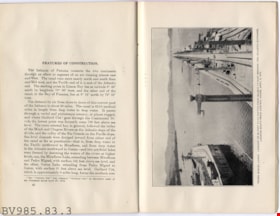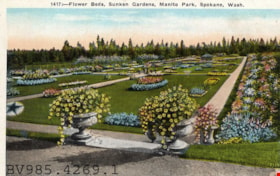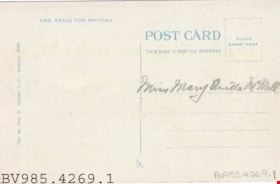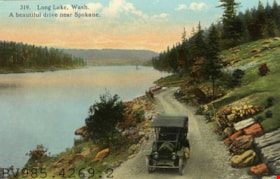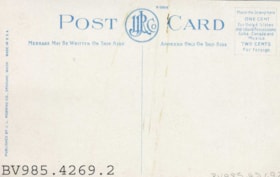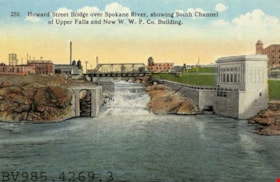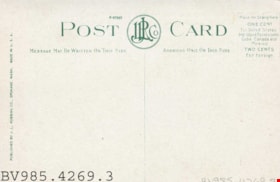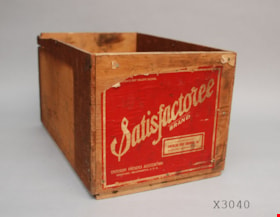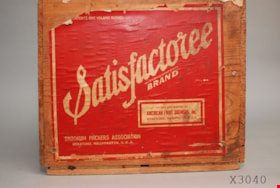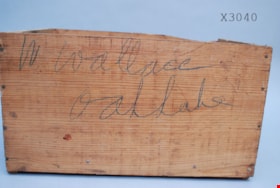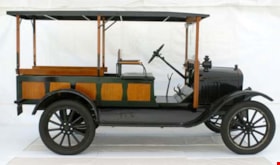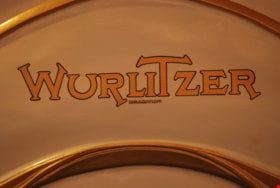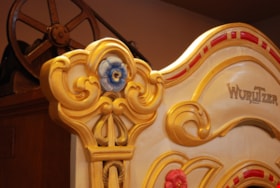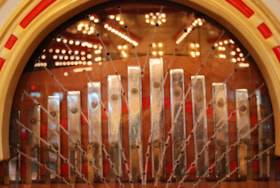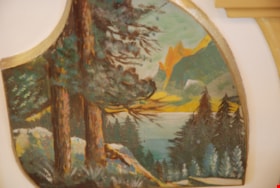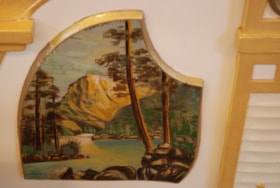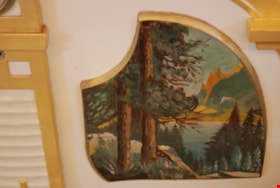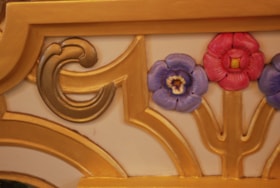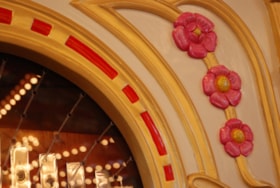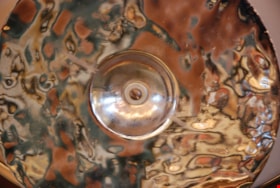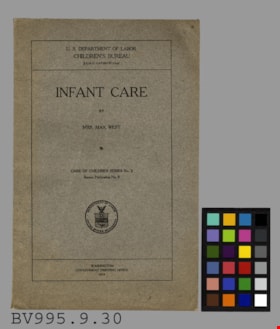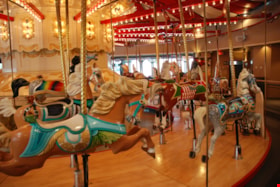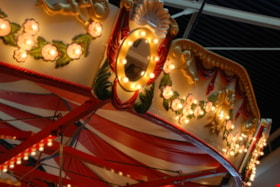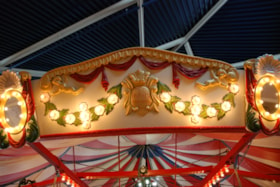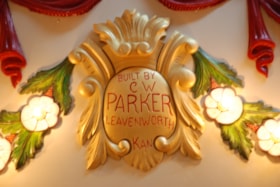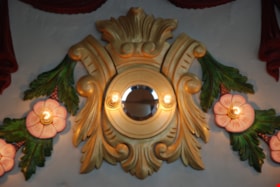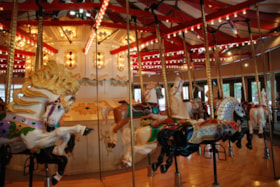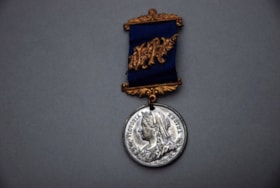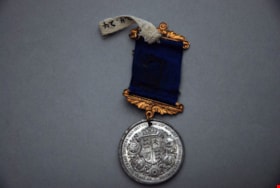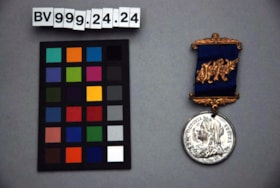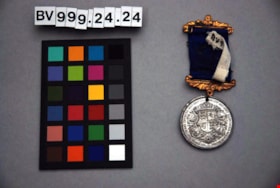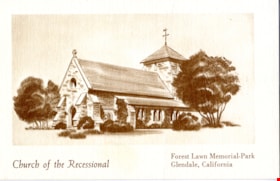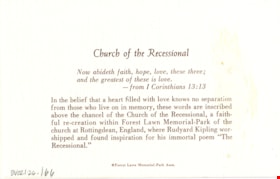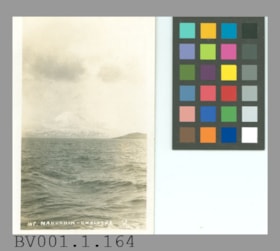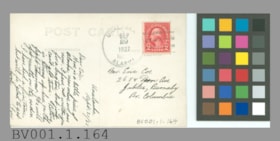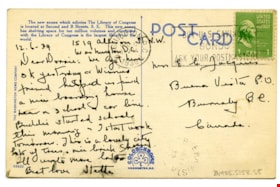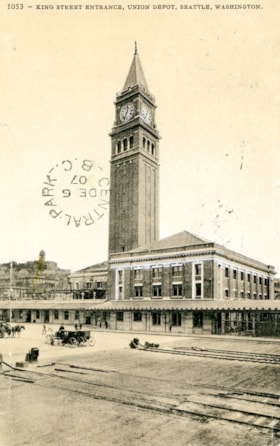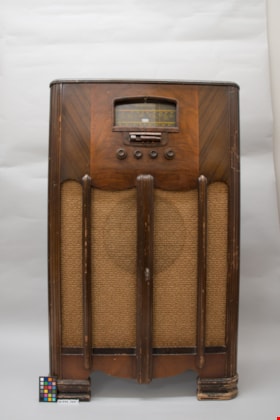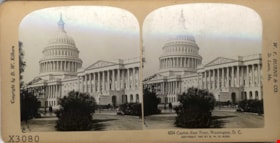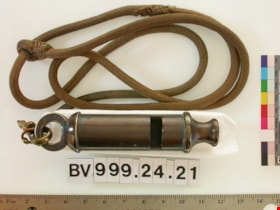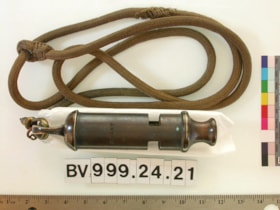Narrow Results By
Subject
- Clothing 1
- Clothing - Military Uniforms 1
- Container 1
- Documentary Artifacts 7
- Documentary Artifacts - Booklets 2
- Documentary Artifacts - Postcards 6
- Documentary Artifacts - Programs 1
- Documentary Artifacts - Stereograph 1
- Musical Instruments 1
- Personal Symbols 1
- Personal Symbols - Medals 1
- Persons - Royalty 1
pamphlet
https://search.heritageburnaby.ca/link/museumartifact6576
- Repository
- Burnaby Village Museum
- Accession Code
- BV985.83.3
- Description
- Official Handbook of the Panama Canal - Booklet -- [1915]. Booklet created by the Washington Government Printing Office. The booklet provides information about shipping facilities, distance saved, cost saving of the canal, tolls, traffic routes, and the Navy's use of the canal. The cover of the booklet is light green with a photograph of a ship passing through the calan. The title of the booklet is printed in red. The cover has been stamped by The Panama Canal Exhibit in San Francisco.
- Country Made
- United States of America
- Province Made
- District of Columbia
- Site/City Made
- Washington
- Title
- Official Handbook of the Panama Canal
- Publication Date
- 1915
Images
postcard
https://search.heritageburnaby.ca/link/museumartifact12744
- Repository
- Burnaby Village Museum
- Accession Code
- BV985.4269.1
- Description
- Sunken Gardens, Manito Park - Postcard. Small postcard with a painted photograph of the Sunken Gardens and Manito Park in Spokane Washington. On the reverse side of the card is the name "Miss Mary Anitta McMill", handwritten in pencil. The card was published by John W. Graham & Co. in Spokane Washington. The postcard is 9cm x 14cm.
- Classification
- Written Communication T&E - - Writing Media
- Object Term
- Postcard
- Maker
- John W. Graham & Company
- Country Made
- United States of America
- Province Made
- Washington
- Site/City Made
- Spokane
Images
postcard
https://search.heritageburnaby.ca/link/museumartifact12745
- Repository
- Burnaby Village Museum
- Accession Code
- BV985.4269.2
- Description
- Long Lake - Postcard. Small postcard with a colour tinted photograph of Long Lake Washington, near Spokane. The photograph is of a card driving on the road along side the lake shore. On the reverse side of the card is a spot for a note and address. On the top right corner of the back there is an assigned spot for a stamp that states that postage is one cent for United States and Island Possessions, Cuba, Canada and Mexico, and two cents for foreign destinations. The postcard was published by J.L. Robbins Co. in Spokane, Washington. The card is 8.5cm x 13.5cm.
- Classification
- Written Communication T&E - - Writing Media
- Object Term
- Postcard
- Maker
- J. L. Robbins Co
- Country Made
- United States of America
- Province Made
- Washington
- Site/City Made
- Spokane
- Title
- 319. Long Lake, Wash. A Beautiful Drive Near Spokane.
Images
postcard
https://search.heritageburnaby.ca/link/museumartifact12746
- Repository
- Burnaby Village Museum
- Accession Code
- BV985.4269.3
- Description
- Howard Street Bridge - Postcard. Small postcard with a colour tinted photograph of the Howard Street Bridge over Spokane River. The photograph shows the South Channel of the Upper Falls and the new W.W.P. Co. Building. On the reverse side of the card is a spot for a note and address. On the top right corner of the back there is an assigned spot for a stamp that states that postage is one cent for United States and Island Possessions, Cuba, Canada and Mexico, and two cents for foreign destinations. The postcard was published by J.L. Robbins Co. in Spokane, Washington. The card is 8.8cm x 13.7cm.
- Classification
- Written Communication T&E - - Writing Media
- Object Term
- Postcard
- Maker
- J. L. Robbins Co
- Country Made
- United States of America
- Province Made
- Washington
- Site/City Made
- Spokane
- Title
- 250. Howard Street Bridge over Spokane River.
Images
postcard
https://search.heritageburnaby.ca/link/museumartifact89212
- Repository
- Burnaby Village Museum
- Accession Code
- BV018.20.4
- Description
- postcard; color lithographed scene of Second Avenue in Seattle, Washington. A sign says "The Gateway to Alaska, Seattle, Washington". There are trams and people in Edwardian clothes on the street, there's a horse and buggy and cars on the road. The back of the postcard addressed to Miss M. George. Postcard published by Trattner Post Card Co., Seattle, Washington. Cancelled in Seattle, Washington, Terminal Station on July 25, 1917 at 10am. "Rainier National Park opens June 15". Postcard addressed to "Miss M. George / c/o National Drug / Vancouver / B.C." Handwritten in ink: "July 23 / Dear Miss George: Am sure in some lively place, not like N.V. Will see you again before long. / Budd"
- Object History
- Wilhelmina (Mina) George was the second female pharmacist in BC and ran the West Burnaby Pharmacy.
- Elsie Impett (later MacDonald) was born in 1902 in England. Her family setted at Fenwick Avenue, Burnaby. She worked as a clerk and married James MacDonald in 1923 in New Westminster.
- Classification
- Written Communication T&E - - Writing Media
- Object Term
- Postcard
- Measurements
- L: 19.5 cm W: 18.5 cm
Images
orchard crate
https://search.heritageburnaby.ca/link/museumartifact79909
- Repository
- Burnaby Village Museum
- Accession Code
- X3040
- Description
- Wooden crate with a red paper label on one end for "Satisfactoree Brand, Skookum Packers Association, Wenatchee, Washington, U.S.A." Packed by the "American Fruit Growers, Inc., Wenatchee, Washington. U.S.A. The contents of the crate is one volume bushel.
- Subjects
- Container
Images
automobile
https://search.heritageburnaby.ca/link/museumartifact38527
- Repository
- Burnaby Village Museum
- Accession Code
- BV997.40.1
- Description
- This vehicle is a 1924 Ford Model T converted to a light delivery truck known as a "Depot Hack". The original body has been removed and an open wooden truck body has been custom built for the vehicle. The metal parts of the vehicle are painted black and the wood (mahogany?) is finished with a clear varnish. The radiator core is protected by a honeycombed front grill. The radiator cowling has the maker's brand stamped in the top. There is a white commercial license plate with red lettering mounted on right front of the dash, next to lamp. The vehicle has two electric front headlights and one rear light. It also has two incomplete carriage lamps screwed to the dash. There is one manual windshield wiper mounted on the vertical windshield. There is a horseshoe mounted on the right side inside of the dashboard. The "Buzz" coil box is mounted in the centre of the dash with a odometer on the left and key and meters on the right. The wheels have wood spokes and steel rims.
- Object History
- This 1924 Ford Model T vehicle may have arrived in Steveston around 1925 and used by a local family. The 1924 Ford Model T Depot Hack truck was built from the running gear of the original Model T Ford by Ernie Harrison. Ernie purchased the running gear of the Ford Model T around 1966 and built it from the ground up. Ernie took measurements from a "Depot Hack" that belonged to a collector in Vancouver and combed swap meets in British Columbia and Washington State in search of original car parts. Ernie belonged to the Model A and Model T Ford Club and took this truck in many parades. Around 1969, the truck was sold to a private collector before being sold to another collector in 1995. The vehicle was acquired by the Burnaby Village Museum in 1997. The Depot Hack rear body is not authentic but the original concept has been retained.
- Classification
- Land Transportation T&E - - Land Transportation Accessories
- Object Term
- Automobile
- Marks/Labels
- "Ford / MADE IN CANADA", embossed above grill on top of radiator cover "EXPRESS & DRAY" "1921" "487" "VANCOUVER, B.C.", embossed on license at front of vehicle. "Ford" is embossed on each running board
- Country Made
- Canada
- Province Made
- Ontario
- Site/City Made
- Windsor
Images
band organ
https://search.heritageburnaby.ca/link/museumartifact33964
- Repository
- Burnaby Village Museum
- Accession Code
- BV991.21.1
- Description
- This is a Wurlitzer Military Band Organ, Style 146B. Built by the Rudolph Wurlitzer Company, ca 1925. The organ is supposed to recreate the sound of a 20-piece military band, with percussion instruments that include bass drum, snare drums, cymbals, and xylophones, as well as pipes to reproduce the sounds of trumpets, trombones, flutes, and violins. This band organ is operated by paper rolls based on Wurlitzer's unique, 46 note roll scale, "Style 150". Our Model 146B has duplex roll frames, allowing continuous playing, one roll rewinds as the other is playing. An electric motor mounted on the top uses a belt to drive a crankshaft that powers both the air bellows that feed the various music pipes as well as the roll mechanism. The band organ was originally intended to be used with a carousel out of doors. A perferated sheet of plexie glass has been placed over the front opening to reduce the volume of the instrument inside the carousel building. Outside Visible Snare Drum on proper right Bass Drum with cymbal on proper left Inside 16 Octave Violin Pipes 3 Wooden Trombones 3 Octave Stopped Bass Pipes 15 Wooden Trumpets 15 Stopped Flute Pipes 16 Violin Pipes 9 Open Pipes Bottom 3 Open Bass Pipes 9 Stopped Accompaniment Pipes 16 Stopped Melody Pipes Bells 16 Bell Bars, playing form the musical roll.
- Object History
- The band organ was purchased and restored by the Friends of the Carousel to replace the original organ that had been sold before the carousel was acquired for the Burnaby Village Museum. The Friends of the Carousel bought this machine from a collector in Spokane, Washington. He had obtained it from a closed down travelling carnival company in Reno, Nevada. They had used it with a carousel in the American mid-west.
- Marks/Labels
- "Wurlitzer", painted in gold on front of organ
- Country Made
- United States of America
- Province Made
- New York
- Site/City Made
- North Tonawanda
Images
booklet
https://search.heritageburnaby.ca/link/museumartifact36711
- Repository
- Burnaby Village Museum
- Accession Code
- BV995.9.30
- Description
- Infant Care - Booklet -- [1914]. Booklet from the U.S. Department of Labor Children's Bureau, called Infant Care by Mrs. Max West. The booklet is Number 2 of the Care of Children Series and Bureau Publication Number 8. The booklet was printed in Washington by the Government Pringting office in 1914. The booklet measures 15cm x 23cm.
- Object History
- Donor inherited object from the estate of his father, Dr. Stanley H. Sievenpiper.
- Country Made
- United States of America
- Title
- Infant Care
- Publication Date
- 1914
Images
carousel
https://search.heritageburnaby.ca/link/museumartifact71793
- Repository
- Burnaby Village Museum
- Accession Code
- BV993.50.1
- Description
- C.W. Parker Carousel. Hand-carved wooden carousel built in Leavenworth, Kansas in 1912.
- There are 36 wooden horses and 1 chariot plus 4 cast aluminum ponies. The Carousel has 500 major parts, including 14 rounding boards, 14 shields, 52 scenery panels, 140 mirrors, 28 stationary brass poles and 858 11-watt lights.
- Originally the carousel was powered by a steam engine but is now powered by a three-phase electrical motor capable of 5 horsepower. The speed of the carousel is approximately 5 revolutions per minute.
- The carousel is housed in the Don Wrigely Pavilion at the Burnaby Village Museum and is in operation during the museum's open hours.
- Object History
- This carousel was built in 1912 at Leavenworth Kansas by C.W. Parker and was the 119th one made by them.
- It was originally sold in 1913 to Mr. F.K. Leggett of Houston Texas for $5,886.00 and was originally equipped with a steam engine and "wishbones/grass-hopper/jumping horse" mechanisms. It toured Texas for two years with the Lone Star Circus then in 1915 the machine was shipped back to the factory.
- It is believed that the machine was rebuilt by the factory, had some fancier horses and heavier rounding boards added. The jumping mechanism may have been changed then as well.
- Some of the horses are c.1917 and some 1920-22.
- The factory records consulted do not tell for certain where the machine went between 1915 and 1936, possibly to San Jose, CA from 1918 until 1922 and then to San Francisco California, or in Tacoma, Washington.
- In 1936 it was purchased, and was in operation at Happlyland in Vancouver by May 1936. The Parker #119 was put into a pavilion which had been built in 1928 by a rival company (Philadelphia Toboggan Company - P.T.C.) and was located next to the "Shoot the Chutes" ride. Here it remained until Happyland was demolished in 1957. Parker #119 was moved to the new small pavillion in Playland until that too was demolished in 1972.
- From 1972 to 1989, Parker #119 was operated outdoors, and was put away each winter. In 1989 it was announced that the carousel would be sold off horse by horse at an auction in New York. Ms. Venus Solano and Mr. Doug McCalum and other local people came together to "Save the Carousel" and formed the "Friends of the Vancouver Carousel Society".
- In May 1989, Burnaby Village Museum agreed to provide a home for the carousel and the "Friends", led by President Don Wrigley, set about raising the $330,000 to purchase the machine. Keith Jamieson, a carousel expert, was brought in to coordinate the rebuilding project. With a lot of hard work, the help of the Government of British Columbia and the support of the Municipality of Burnaby, the carousel was purchased. Funds were also raised to pay for the restoration, and Burnaby agreed to build a new pavilion for it as a Centennial project.
- Measurements
- Diameter: 2.19 metres (40 feet) at the platform
- Outer circumference: 38.1 metres (125 feet)
- Inner circumference: 23.34 metres
- Height: 8.84 metres (29 feet) at the centre
- Weight: 16 metric tons or 16,000kg empty (14 ½ tons) and 19 metric tons loaded (17 tons). Each horse weighs between 28-37 kg (75-100 pounds).
- Maker
- C. W. Parker Company
- Country Made
- United States of America
- Province Made
- Kansas
- Site/City Made
- Leavenworth
- Subjects
- Recreational Devices - Carousels
- Names
- Pacific National Exhibition (PNE)
- Lower Mainland Association of the Friends of the Vancouver Carousel
- C.W. Parker Company
Images
medal
https://search.heritageburnaby.ca/link/museumartifact39914
- Repository
- Burnaby Village Museum
- Accession Code
- BV999.24.24
- Description
- Medal, silver-coloured; Queen Victoria Jubilee 1897; front -design of Queen Victoria showing head, shoulders and two laurel sprigs; centre - coat-of-arms, surrounded by 5 circles, each with symbol at centre; hangs from decorative brass bar with blue grosgrain ribbon connecting it to similar bar at top; partial fastener on back; ribbon is hand-sewn on to the brass bars.
- Object History
- Part of a donation pertaining to Frederick Homer Cassels, a WWI Veterinary service army veteran.
- Frederick Homer Cassels was born June 25th 1870 or 1872 in Paisley, Ontario. He moved to BC in 1914 and settled in Vancouver. Cassels was a veterinary surgeon in the 103rd Battalion of the Canadian Expeditionary Force during World War I.
- Prior to that, Cassels worked in Washington State. He married Emily Frances McMullen in England in 1919. They came back to Canada and settled in Burnaby the same year.
- He later worked as a marble worker, sticker and polisher at Continental Marble Works until 1932. The family settled in Burnaby's "Skunk Hollow" area, an area off Boundary Road at 13th Avenue and Clydesdale. Their children attended Schou St. School.
- He passed away July 31 1948.
- Marks/Labels
- "VICTORIA REGINA" around image; on reverse, around edge, is stamped "VICTORIA, QUEEN AND EMPRESS, 1837 - 1897, THE LONGEST AND MOST ILLUSTRIOUS REIGN ON RECORD"; hand sewn to the front of the ribbon are gold metal initials "VR" and leaf motif
- Names
- Cassels, Frederick Homer
Images
Memorial program
https://search.heritageburnaby.ca/link/museumartifact91245
- Repository
- Burnaby Village Museum
- Accession Code
- BV021.26.166
- Description
- Memorial service program created by Forest Lawn Memorial-Park Association; folded cardstock with illustration of "Church of the Recessional" on front and printed text within in brown ink. Memorial service program for T. Boyd Haskell, born September 7, 1914, died July 5, 1969. Memorial service was held on July 10, 1969 at Forest Lawn Memorial-Park, Glendale, California.
- Object History
- Item came from a scrapbook documenting the early years of the Simpsons-Sears store located at 3660 Kingsway (after 1959 4750 Kingsway) including the opening day, staff events and other activities that store manager, T. Boyd Haskell was involved in. T. Boyd Haskell was manager of the Burnaby Simpsons-Sears store between 1953 and 1962. After graduating from college, Haskell joined the Sears-Roebuck department store chain. In 1953 he moved to Vancouver from Washington State to set up the new store in Burnaby. In 1962, Haskell left Simpsons-Sears in Burnaby and transferred to the Sears store in Los Angeles. During his time in British Columbia, Haskell served as the President of the Greater Vancouver Tourist Association (1958-1959), President of the Community Chest and Councils of Greater Vancouver (1960) and was also a member of the board of directors of the B.C. Lions football team. Haskell died in Arizona in 1969 at the age of 54 years.
- Category
- 08. Communication Artifacts
- Classification
- Documentary Artifacts - - Other Documents
- Object Term
- Program
- Colour
- Beige
- Brown
- Measurements
- 10 cm x 32 cm; folded to 10 cm x 16 cm
- Country Made
- United States of America
- Subjects
- Documentary Artifacts - Programs
Images
postcard
https://search.heritageburnaby.ca/link/museumartifact41377
- Repository
- Burnaby Village Museum
- Accession Code
- BV001.1.164
- Description
- Postcard: black and white photo with unevenly centred white border; vertical; shows ocean, snow-topped mountain behind, sky and clouds; printed in white at bottom, hand-lettered "MT. MAKUSHIN - UNALASKA" "eB"?, copyright 1927; in grey on reverse, "POST CARD", line down centre; at left, "CORRESPONDENCE", at right "ADDRESS"; handwritten in black ink sideways, "Unalaska Sept. 21/ 27" "Dear Eric. Here is a little piece of Alaska, near where we are now. I have not written to you for a long time but just can't get time. Betting is strong up here on the fight tomorrow. We will get results on the radio. I have had a fine time, but will be glad to get home" "Iver"; addressed to "Mr. Eric Coe 2684 Fern Ave Jubilee, Burnaby Br. Columbia."; red stamp "UNITED STATES POSTAGE" "2 CENTS 2", portrait of "WASHINGTON"; cancelled by four lines; large postmark "UNALASKA ALASKA" "SEP 29 1927"; some darkening at edges, spot
- Object History
- "Iver" is Iver Gillen, brother of Denver Gillen, illustrator of the 1936 "Rudolph the Red-Nosed Reindeer".
- Classification
- Written Communication T&E - - Writing Media
- Object Term
- Postcard
- Colour
- Black
- White
- Country Made
- United States of America
- Title
- Mt. Makushin - Unalaska
- Publication Date
- 1927.
- Names
- Coe, Eric
Images
postcard
https://search.heritageburnaby.ca/link/museumartifact46316
- Repository
- Burnaby Village Museum
- Accession Code
- BV985.5158.55
- Description
- Postcard: "Congressional Library Annex, Washington, D.C."; posted to "Buena Vista PO Burnaby", 1939
- Object History
- Object sent to the E.C. Jacques family at Buena Vista post office.
- Classification
- Written Communication T&E - - Writing Media
- Object Term
- Postcard
Images
postcard
https://search.heritageburnaby.ca/link/museumartifact89213
- Repository
- Burnaby Village Museum
- Accession Code
- BV018.20.2
- Description
- postcard; 1053 King Street Entrance of the Union Depot in Seattle, Washington sent from N. Walsh to Miss Mina George. On the back, the 1 cent Ben Franklin stamp is cancelled in Seattle on Dec 5, 1907 at 10:30am and in the front of the postcard, the cancelled stamp says Central Park, BC Dec 6, 1907. Postcard addressed to "Miss Mina George / Central Park / B.C." Written by N. Walsh: "Seattle / This depot is a little nicer than the one we have in Vancouver / Yours sincerely, N. Walsh"
- Object History
- Wilhelmina (Mina) George was the second female pharmacist in BC and ran the West Burnaby Pharmacy.
- Elsie Impett (later MacDonald) was born in 1902 in England. Her family setted at Fenwick Avenue, Burnaby. She worked as a clerk and married James MacDonald in 1923 in New Westminster.
- Classification
- Written Communication T&E - - Writing Media
- Object Term
- Postcard
Images
radio
https://search.heritageburnaby.ca/link/museumartifact7102
- Repository
- Burnaby Village Museum
- Accession Code
- BV985.399.1
- Description
- Cabinet style radio is a Stromberg - Carlson, Model No. 972, produced ca. 1940. It can receive standard broadcast and shortwave transmissions. It is also possible to plug in an electronic phonograph to have it play through the radio. There are six push buttons on the front that allow the user to preset stations for quick tuning. . Two of the stations, KOMO and KIRO, broadcast from Seattle, Washington and stations CJOR, CKWX, CKMO broadcast from Vancouver. There is also a CBR station which is the Citizens Band radio. Glued inside the radio cabinet is an envelope that contains a manual, "INSTALLATION AND OPERATING INSTRUCTIONS / FOR STROMBERG-CARLSON NO. 972 RADIO RECEIVERS" and a warranty card "Stromberg-Carlson / Stromberg-Carlson Telephone Mfg. Co. of Canada Limited/ 211-219 Geary Ave. / Warranty Registry Department Toronto 4, Canada". There is also an envelope with three cards stapled together that have punch out radio station call letters. one for "CANADIAN STATIONS" and two for "AMERICAN STATIONS".
- Object History
- Originally founded in 1894 to manufacture telephones, the Stromberg-Carlson company also produced radio components, and began selling their own complete sets during the early 1920s. By that time, the radio craze had fully absorbed the American public, and radio pioneer RCA was cornering the market after scooping up over 2,000 broadcasting-related patents. Stromberg-Carlson entered the field by making smaller parts for tube radios. Eventually, the company applied its telephone-audio expertise to develop a successful line of radio headsets. In 1923, the company was licensed to produce the “Neutodyne” radio circuit designed by Dr. L. A. Hazeltine. Stromberg-Carlson’s first set came out in early 1924, and the company steadily grew its radio production, eventually requiring RCA licenses for several products. In 1926, Stromberg-Carlson became the first manufacturer to merge phonograph and radio technology by incorporating a phonograph jack into its radio chassis. By the end of the decade, Stromberg-Carlson sold sets with fully integrated radio and turntable technologies, and the company’s radio sales surpassed that of its telephones... The 1930s represented boom years for Stromberg-Carlson’s radio development, as it introduced new modifications like automatic volume control, improved amplifying methods, and an early push-button tuning mechanism. Ads from the late '30s emphasize other innovations, like the unique Stromberg-Carlson “acoustical labyrinth,” a complex baffle design which improved sound quality by guiding audio waves through a series of interlocking chambers, and its “Te-Lek-Tor” series, which included remote-control capabilities. “Let your dealer arrange an audition,” was the brand’s cheeky slogan, emphasizing its reputation for superior sound quality. Over the next 20 years, Stromberg-Carlson created an array of gorgeous Art Deco-inspired radios, from the sleek, ivory-colored 140-K console to the tabletop 225-H with its floral-patterned speaker grill and octagonal dial. After the company’s merger with General Dynamics in 1955, the business was restructured to focus production on telephone products, and its radios were discontinued.
- Reference
- http://www.collectorsweekly.com/radios/stromberg
- Country Made
- United States of America
- Canada
- Province Made
- Ontario
- Site/City Made
- Toronto
Images
stereograph card
https://search.heritageburnaby.ca/link/museumartifact79975
- Repository
- Burnaby Village Museum
- Accession Code
- X3080
- Description
- Stereograph card produced by W.F. Burns & Company/ B. W. Kilburn. It is of a picture titled "6554 Capitol, East Front, Washington, D.C./ COPYRIGHT 1891 BY B. W. KILBURN". There is information on the back about the publishing company.
Images
whistle
https://search.heritageburnaby.ca/link/museumartifact39911
- Repository
- Burnaby Village Museum
- Accession Code
- BV999.24.21
- Description
- Whistle. Metal, World War 1 military, whistle on cord. Cord is attached to whistle's ring by metal clip.
- Object History
- Whistle belonged to Frederick Homer Cassels who was a World War I Veterinary Service Army veteran. Frederick immigrated to Burnaby from England in 1919.
- Frederick Homer Cassels was born June 25th 1870 or 1872 in Paisley, Ontario. He moved to BC in 1914 and settled in Vancouver. Cassels was a veterinary surgeon in the 103rd Battalion of the Canadian Expeditionary Force during World War I.
- Prior to that, Cassels worked in Washington State. He married Emily Frances McMullen in England in 1919. They came back to Canada and settled in Burnaby the same year.
- He later worked as a marble worker, sticker and polisher at Continental Marble Works until 1932. The family settled in Burnaby's "Skunk Hollow" area, an area off Boundary Road at 13th Avenue and Clydesdale. Their children attended Schou St. School.
- He passed away July 31 1948.
- Classification
- Sound Communication T&E - - Sound Communication Devices
- Object Term
- Whistle
- Marks/Labels
- "Patent 57208" "PATENT"
- Subjects
- Sound Communication Tools and Equipment
- Wars
- Wars - World War, 1914-1918
- Clothing
- Clothing - Military Uniforms
